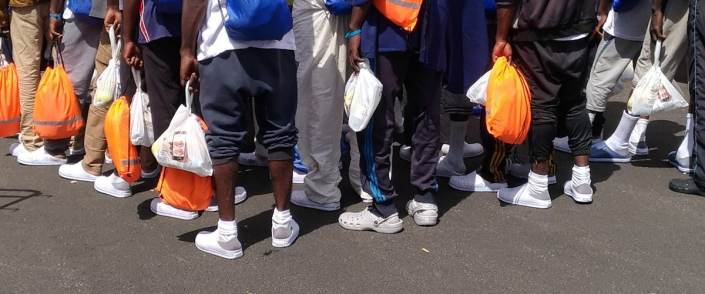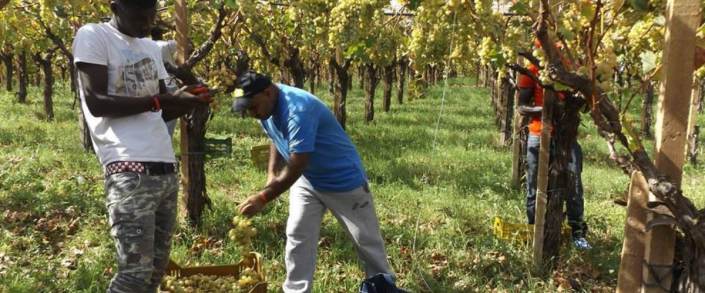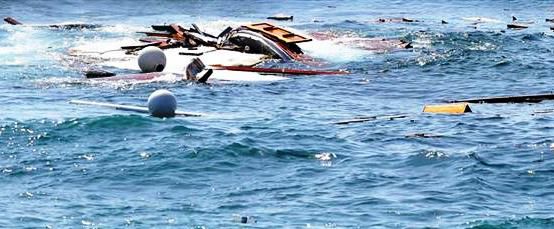Reception, the prefecture’s new invitation to tender for 1800 places, the first in the Salvini era. “Many migrants from the reception centre of Mineo”
MeridioNews.it – 56 million euro for a two-year agreement from June: also in the province of Palermo the Minister of the Interior’s provisions are being made concrete. “Some centres are already closing. It is creating new invisibles in our area.”
“Reception from now onwards will be intended exclusively to be like room and board for migrants, the government will not deal with integration any more” comments Alberto Biondo, spokesperson for Borderline Sicilia (who have monitored immigration in Sicily for 11 years). It comes after a new invitation to tender was issued from the Palermo prefecture “for the award of management services of reception centres”: little more than 56 million euro were set aside by the Minister of the Interior for the two-year agreement – from June 1, 2019 to May 21, 2021 – that will serve to house 1800 migrants in the entire province. The notice was already organised in 2017 and then was suspended with the advent of the new Lega-5stelle government. The new tender and the provisions that the Minister of the Interior has given were in fact different in respect to the indications given previously by the Palermo prefecture. An affair that in reality would not have concerned only the Sicilian capital but was repeated in many parts of Italy. In fact, many prefectures in 2018 had to suspend notices and redo them.
It is, in short, the first reception in the era of Salvini. And it’s noticeable. Because of many discussions around the 35 euro per person, granted from previous governments to the reception system in order to organise all the necessary services for asylum seekers in Italy, for the first time it changed to the current 26 euro per person.
“In fact, those who have organised for 35 euro per person, with the expenses already done, are losing nine euro per person every hour” – notes Biondo – “and so it creates difficult holes to fill. Those who lose are the guests: the cut has already been made at the personnel level, there are no longer any more operators. In some cases, the migrants are already in phases of self-management. Today in many centres there are no longer mediators, and there are operators that remain alone during their shifts so that if they have to accompany someone to do their paperwork the centre remains uncovered. Thus, the migrants are often unable to even communicate, because of the absence of a mediator.”
The tender for the Palermo prefecture is subdivided into three lots. And one can associate a different type of reception to each of these lots. Lot A comprises of the “supply of goods and services of reception services for a total of 300 places within the centres, situated in the communes of the Palermo province (including the capital)” through “individual housing units made available by the competitor with the reception capacity of a minimum of 8 to a maximum of 50 overall places and with the organisation of services according to the network mode” (that is a single community or centre can make available, if it has them, more buildings). There is then lot B “for a total of 990 places within the centres, situated in the communes of the Palermo Province (including the capital)” in this case through “collective centres (that is one single building) made available by the competitor with the reception capacity of a minimum of 20 to a maximum of 50 places.” Finally lot C “for a total of 510 places within the centres, situated in the Palermo commune, comprised of collective centres made available by the competitor with the reception capacity of 51 to 80 places”: a measure that seems to want to save big reception centres of the Sicilian capital, like for example Casa Marconi in via Monfenera.
In any case, according to the Borderline Sicilia activist, “essentially this guarantees board and lodging and minimum services that no longer ensure a constant presence of an operator. For example, you can guarantee the presence of an operator for only four hours a night and no longer the traditional eight. Furthermore, the cultural mediators only have a small number of hours available to them, the role of the psychologist will be cancelled and even the doctor will have extremely limited hours. The new type of reception is that of parking people. To keep them calm until the commission, that by now has few people, judge their requests for asylum.” Even in Palermo the grip of the Lega-5stelle government on reception is already being felt, exactly like the Borderline Sicilia reports testified.
“Some extraordinary reception centres are closing” Biondo again confirms “perhaps because of the will of the Minister of the Interior to reduce the numbers in reception, or perhaps because the facility managers that, with numbers being too low, don’t have the economic return to justify their continuation. Palermo finds its facilities already fully filled, because of the distribution of many migrants from the Mineo centre it had and will have to confront with this agreement. Furthermore, those who can go forward into the world of reception are and will only be massive corporations, not the small communities, that in reality are often the best. Only those in finance will go forward, with human rights coming second. We will see now who will bid for this tender, if they will confirm our predictions.”
In this context, therefore, reception risks becoming a concern for the few. Nothing but the end of the party, like Matteo Salvini has often repeated. What is worse is that whoever arrives in Italy – a small few, seeing the numbers shown from the Ministry of Interior – will find an obstacle course already starting from what should have been reception, and in addition an increasingly hostile and widespread attitude. With the risk of creating true and real explosives, in Palermo like everywhere. This is the main fear of Biondo: “In this way migrants, in this indefinite situation, will either get fed up, but however they have no way of passing the commission’s exam” observes the Borderline Sicilia activist.
“Therefore, what will happen more and more often is the revocation of reception. There will be more and more invisibles in our territory. People who are easy to exploit, like those who work in agriculture here for example. We have communicated this already to the prefecture.”
Andrea Turco
Translated by Meg McLellan






